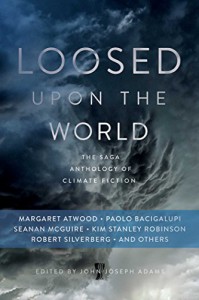

Climate Change Fiction anthology that is horribly plausible, deeply frightening and that fills me with guilt about the mess the generation now in school will inherit from us.
“Loosed Upon The World” is a collection of twenty-six short stories that imagine our future in a world undergoing dramatic climate change.
The message that they have in common is that the next generation will be facing some hard choices, that science may mitigate the effects of climate change but that the way we live today will not survive.
Most of the stories give grimly pragmatic views of how the next generation will play the hand we've dealt them. I find the stories so depressingly credible that I feel I need to apologise in advance to the next generation.
While this IS a collection with a message, it is primarily an collection of excellent, innovative Science Fiction.
I've reviewed my six favourite stories as I've gone along. I've summarised them below.
In addition, I really liked:
- "Outliers" by Nicole Feldringer which was an amusing, quirky view of how to outsource solving the climate emergency. I'd love that to work in real life.
- "The Mutant Stag At Horn Creek" by Sarah K Castle which gave me a close-up view of how life might change in the Grand Canyon.
- "Hot Rods" by Cat Sparks, an enigmatic but very atmospheric tale of the young racing old cars and contracting out to a secret base in the Australian outback in a prolonged drought. I've now bought her short story collection "The Bride Price" to read more of her work.

"Shooting The Apocalypse" by Paolo Bacigalupi is a grim tale set in the same world as his novel "The Water Knife" that describes a brutal future defined by the struggle to control the supply of water in a US that doesn't have enough for everyone.
His message seems to be that the shift, when it comes, will be fundamental and irreversible. The future goes to those who adapt and move forward, not to those who bemoan what they’ve lost or who try to create pockets of wealth where they can pretend nothing has changed.

"The Myth Of Rain" by Seanan McGuire is a chillingly prescient 2015 view of the near future struggle between the rich and the rest of us as the climate fails. Here's part of her vision of the future:
“The thing about lies is that no matter how often you tell them and how much you believe them, they’re not going to become true. “Fake it until you make it” may work for public speaking and falling in love, but it doesn’t stop climate change.
By 2017, it was pretty clear who the liars were, and they weren’t the scientists holding up their charts and screaming for the support of the public.
By 2019, it was even clearer that we’d listened to the lies too long. The tipping point was somewhere behind us, overlooked and hence forgotten."

"A Hundred Hundred Daisies" by Nancy Kress is a story of a boy, Danny, coming of age in the an environment of escalating violence and the looking threat of failure caused by climate change.
What made the story for me was that, in the midst of this clearly-painted grimness, Danny focuses on creating a moment of beauty, related to the “Hundred Hundred Daisies” of the title, for his little sister Ruthie, .
I loved this acknowledgement that creating beauty is important, even when the world you’ve known is ending and that creating a good memory for someone you love is a way of seeding your world with hope.

"The Precedent" by Sean McMullen is one of the stories that has stuck with me most, perhaps because, if I survived to this future world, I'd be one of the people on trial in this story
The narrator is a climatologist, now in his eighties, who spent his life campaigning to prevent or delay climate change. He intends to beat the audit. We get a ringside seat on the audit as he attempts this.
The power of this story comes from the plausibility of the idea and the matter-of-fact way in which these acts of institutionalised cruelty by the self-righteous young are experienced by the mostly guilty but seldom repentant old.
This was my first Sean McMullen story. I've now bought "The Ghosts Of Engines Past" to read more of his work

"Eagle" by Gregory Benford and "Hot Sky" by Robert Silverberg both focus on characters doing difficult and unpleasant things in the face of melting Polar Ice Caps.
"Eagle," tells the story of a woman carrying out an act of eco-terrorism because she believes it is necessary to push people to change their behaviour.
"Hot Sky," tells the story of an ambitious corporate manager hunting icebergs to two home who has to make hard choices when he responds to a distress signal.
Both are character-driven stories that reminded me that the best Science Fiction has real people at the centre of it.

 1
1









